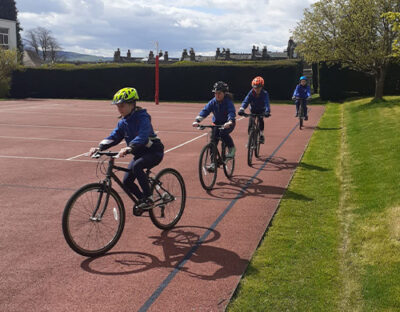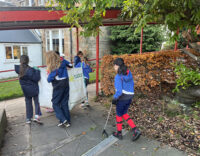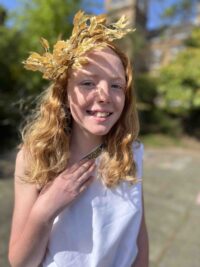Latest

P6 Round-up: A variety of Hands-On Learning

Primary 6 pupils have been actively engaged in a diverse array of hands-on learning experiences, allowing them to explore various subjects and skills in an immersive and memorable way. Let's dive into their exciting activities!
Bikeability: Pedaling Towards Safety and Fun

As shared by Selma (P6):
"For the last few weeks, Primary Six has been taking part in bikeability. A company called Soul Cycles comes to St George's every Friday and gives us a lesson on how to be safe and have fun on bikes. Some of the things that we have learnt are how to brake properly, how to turn and move in and out of cones. My favourite thing that we have done in bikeability is the ABCD check. A stands for air in your tires, B stands for brakes, C stands for chain, and D stands for drop it. We are all enjoying bike ability Level 1 and excited to move onto Level 2."
Gardening Endeavours: Nurturing Green Thumbs

Lydia (P6) shares her gardening experiences:
"Sometimes on a Friday, during activity time, we do gardening. We do several types of gardening like leaf sweeping, weed picking, and moss digging. In moss digging, we use lots of different tools, but the tool I found the most helpful was the knife. It was fun when we tried to dig out the longest piece of moss. We also do weeding, leaf clearing, and litter picking, using various tools and equipment from the greenhouse or shed."
Digestive System Experiment: A Messy but Effective Lesson
Teria (P6) recounts her hands-on digestive system experiment:
"In P6, we have been learning about the human body. When we were learning about the digestive system, we did an experiment about it. We used tights and cereal, water, and banana. First, we put the cereal and banana in a bowl and chopped it up with a knife and fork - this represented the mouth and teeth. Then we put the mixture in a bag and added some yellow liquid - this represented the stomach and stomach acid. After adding other coloured liquids for digestive juices and enzymes, we mushed it all up. Next, we put the mixture through some tights which represented the intestines. We had to squeeze it tightly down to the bottom of the tights and then squeeze the mixture out. It was a really good way to learn about our digestive system, even though it was disgusting!"
Greek Films: Bringing Ancient Plays to Life

Lydia and Pranavi (P6) share their experience with Greek film projects:
"At school, we have been doing Greek plays in groups. We all got to do different plays, and we also got to make films of them. Filming them was fun as we got to dress up. In our groups, we got to pick our play, and as a group, we agreed on the parts. We got to film our characters in different places. We were allowed to bring props from home like swords and shields. Lydia brought in a baby. In ICT lessons, we are learning how to edit our films and change backgrounds. The exciting thing is that we will get to watch all the plays. It has been so much fun doing them, and we cannot wait until they are finished!"
The Skeletal System: Bony Creations and Jokes
Kei (P6) shares her skeletal system learnings and activities:
"P6 have been learning about the human body, including the human skeleton. We learned fascinating facts, such as there are 26 bones in your foot, the smallest bone is the stapes in your ear, the largest bone is the femur in your leg, and you're born with 300 bones but end up with 206 as an adult. We made a skeleton out of bone-shaped dog biscuits, applying our knowledge to recreate it. It was fun and exciting, but also smelly!"
Kei also shared some skeleton-themed jokes:
"Q: What is a skeleton's favourite musical instrument? A: The Trom-bone.
Q: What do you call a skeleton who won't work? A: Lazy bones.
Q: What did the French skeleton call his friend? A: Bone Ami."
Through these engaging activities, P6 pupils have had the opportunity to learn in a hands-on and memorable way, fostering a deeper understanding and appreciation for various subjects and skills.









